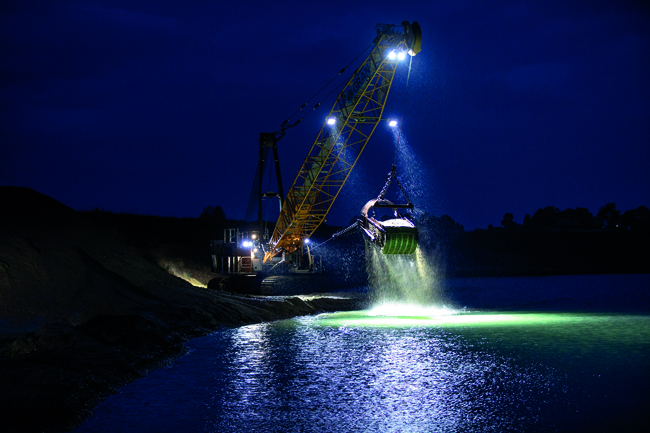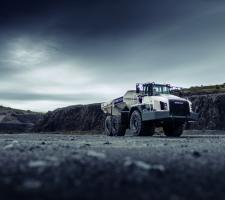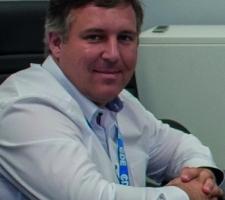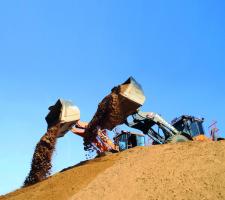
Demand from both government housing and transport infrastructure projects is predicted to help maintain healthy demand for aggregates in Germany over the next few years. Liam McLoughlin reports.
Demand for aggregates in Germany remained healthy in 2018 due to a strong construction sector, according to
The German aggregates industry association adds that prospects for 2019 and the next few years also remain positive with demand from construction projects continuing to rise.
The federal government is working on a housing initiative and the Federal Transport Infrastructure Plan receives €14bn in funding per year. MIRO states that demand for sand, gravel and natural stone products currently amounts to more than 500 million tonnes per year.
“This is good news for the industry and it is expected that demand will remain stable or grow at a high level,” says MIRO president Dr. Gerd Hagenguth.
He adds that there is a strong connection between MIRO’s technical work and the representation of its members’ interests at the federal government and European levels.
“With the office in Duisburg - responsible for technology and standardisation - and the office in Berlin which has operated since 2018 - responsible for politics and communication - we have paved new ways for our work,” says Hagenguth. “Meanwhile, our topics are perceived at the highest political level in terms of the interests of gravel, sand and natural stone companies.”
MIRO has reiterated its warning about the problems of regional supply bottlenecks in gravel, sand and natural stone graining across Germany.
Hagenguth says the situation is acute because, on the one hand, companies are gaining their authorised raw material supplies faster than originally anticipated due to high demand, while at the same time approval procedures for expansion or reclassification are becoming more complex and long lasting.
Describing the issue as “a dramatic traffic jam”, Hagenguth says politicians at all levels must move to address this issue quickly and consistently.
“We need shorter approval procedures and longer extraction periods so that we can continue to meet demand for aggregates from domestic deposits through short routes,” says Hagenguth. “We need clear decisions and legal certainty for companies.
“Access to domestic mineral resources must be guaranteed. That is, deposits are to be protected from overbuilding or competing uses. What we do not need….are commodity taxes. These do not have a steering effect but, in stark contrast to the creation of affordable housing, would inevitably make construction more expensive.”
MIRO says its hopes are currently focused on the new edition of the federal government’s raw materials strategy for Germany, the effects of which should be seen by mid-2019.
Stefan Hunger, business regional manager for Europe and Russia at wet global aggregates processing equipment company
“At the same time Germany is experiencing huge demand for infrastructure, housing and civil works and typically around the urban centres such as Munich, Frankfurt and other major cities,” Hunger adds. “Therefore, it will be necessary for Germany to look to ways to maximise value from construction and demolition waste and re-use that waste to meet supply and demand in the face of declining natural resources. That said, it is currently very difficult to secure a permit for construction and demolition waste plants in Germany in a radius from build that makes economic sense.”
However, Hunger says that it is only a matter of time before environmental legislation is introduced similar to that in the UK and Switzerland including landfill levies, which will drive an ever-greater need for washing technology such as that produced by CDE.
“That is why the German market is a significant focus for us given our expertise in recycling waste and providing customers with a high-value end product,” says Hunger. “Perception has been that recycled waste is of no real benefit. This could not be farther from reality as a substantial amount of construction activities are non-structural and sooner or later the German market will see that as a real solution to its current building challenges.“
With hundreds of billions of euros being spent on German infrastructure projects over the coming years,
Terex Trucks says that many are predicting that the level of infrastructure investment in the country will continue to grow. Over the coming years, €269.6bn will be spent on modernising and interlinking Germany’s transport infrastructure. This includes €127.1bn that has been put aside to fund the renovation of the country’s road network, which is estimated to take place until 2030. It’s not just the roads that are getting a facelift, though – everything from Germany’s airports to its fibre-optic cable networks are going to be upgraded.
“Germany has the biggest economy in Europe from a manufacturing standpoint,” says Paul Douglas, managing director of Terex Trucks. “Given that we’ve just released an upgraded TA300 articulated hauler, we want to have a strong dealer network in place throughout Germany. The Terex Trucks brand is already well known thanks to our three German dealers, Klarmann-Lembach, Fischer & Schweiger and Baumaschinen Rehnen. However, we are keen to sign more German dealers, particularly in the east and north-east of the country.”
Terex Trucks offers two articulated haulers in Germany: the TA300 and – the biggest hauler in the company’s range – the TA400. These machines are typically used on large-scale construction projects as well as in quarries and on infrastructure developments.
“Looking at the numbers, German customers show a preference for the TA300 because they like its high flotation tyres, mechanical suspension and over-hinged tailgate,” says Douglas. “It’s a relatively maintenance-free machine.” Since August 2018, German customers have been able to get their hands on an upgraded version of the TA300, complete with the new and improved EP320 transmission.”
With the rental market dominating in Germany, Douglas says that Terex Trucks has to ensure that its machines are extremely robust and durable to minimise downtime for the customer.
German construction machinery manufacturers are concerned about a no-deal Brexit – the UK exiting the European Union without a deal - and the possible disintegration of the EU.
Rising global economic challenges can be mastered only with a strong, united Europe, according to the
This was the view by attendees at the VDMA’s construction machinery-specialised group conference held recently in Frankfurt am Main.
The VDMA says that, from an economic point of view, the country’s construction industry is scaling new heights. Total domestic and foreign sales of equipment that was made in Germany (by either German or foreign-owned manufacturers) increased by 12% in 2018. Total sales for construction equipment made in Germany were €12.1bn in 2018, of which €4bn were sales on the domestic market and €8.1bn were export sales.
Sales of German-made equipment on the domestic market grew by 9% compared to the previous year, a greater increase than the previous record annual increase of 8% set in 2007.
Although a moderate decline is anticipated, the VDMA estimates the German market will remain very strong. Representatives of the construction machinery manufacturers expect industry turnover to grow by 3-5% this year in Germany.
“We are at an all-time high, but this time the road that led us here was more stable and sustainable than in 2007,” said Franz-Josef Paus, chairman of the VDMA. “This gives us hope that the industry will be able to maintain this good level for longer.”
He believes that only the lack of qualified personnel on the customer side had a dampening effect and that the construction industry in Germany and Europe remains strong and stable overall.
German gravel pit operator Gran has opted to deploy a duty cycle crawler crane from
The machine is not only being used for gravel extraction but also for the development and recultivation of the gravel extraction site.
The HS 8130 HD has a 23-metre boom and is fitted with a Hendrix dragline bucket 7½ HS with a capacity of 5.7 m³. At a digging depth of 8-10 m the duty cycle crawler crane manages 450 m³ of material per hour. Depending on the duration of the shift, this results in a daily performance of 4,500 m3 or 9,000 tonnes.
The machine’s two high-performance winches provide a line pull of 2 x 350kN and are designed to mean that a high level of material handling is possible with the duty cycle crawler crane.
Gran has the HS 8130 HD in operation four days a week in single-shift operation. The machine features an eco-silent mode function, which is designed to enable a significant reduction in diesel consumption to be achieved without any impact on operative output. Liebherr says that this results in Gran achieving a fuel consumption of only 40 litres per hour with an engine speed of 1550 rpm. It adds that eco-silent mode also reduces the noise emission of the duty cycle crawler crane.
The Gran company was founded in 2004 and the new HS 8130 HD is the fourth machine from the HS series in its fleet. Gran is planning to extend its fleet with four further Liebherr duty cycle crawler cranes (2 x HS 8130 HD and 2 x HS 8100 HD). It says that crucial factors for this decision are the robust steel construction, the economic and quiet diesel engine and the high pull force of the winches, as well as the clear and well-arranged control panel in the operator’s cab. “The complete design of the machine is very well thought out,” says owner Andreas Gran. “We achieve excellent turnovers with an impressively low fuel consumption. That’s why the HS 8130 HD is the perfect machine for extracting gravel.”
Kieswerke Silzen-Peissen (KSP) has purchased three new
The two KSP plants in Silzen comprise about 70ha of approved mining area, of which approximately 20ha is being developed underwater and is called Plant 1. The materials obtained from the water in Plant 1 are cleaned in the company’s washing systems and then sorted. Plant 1 mainly produces concrete aggregates, screes and special building materials for use on golf courses and riding arenas as well as special sands for playgrounds. The second plant in Silzen – Plant 2 – has been operating for about 15 years and is directly opposite Plant 1. Plant 2 produces materials for applications including road building. The permit for this work covers approximately 40ha.
The two wheeled loaders are used in the above-ground mining and for various loading operations, whilst the DX530LC-5 excavator is responsible for the extraction and earthworks carried out underwater at Plant 1.
The underwater work was previously carried out using a nearly 40-year-old scraper, which had to be replaced at short notice. There were strict requirements that the new excavator had to meet: it had to be able to work in a water depth of up to 9m and be delivered within two months.
Atlas Hamburg was able to offer a solution for this to the Silzen-Peissen gravel works using the Doosan DX530LC-5 with a customised 18m boom. In order to optimise the excavator for underwater work, Atlas Hamburg also made a number of other changes to the machine.
As a result, 900mm-wide tracks have been installed to keep the ground pressure as low as possible. The stability with the long boom was increased by widening the undercarriage and adding an additional three-tonne counterweight. For machine control, Atlas Hamburg also installed a 2D control system from Zimmermann. This helps the operator to work efficiently and accurately, even without being able to see the attachments at the end of the boom. In addition, the excavator uses a submerged quick coupler, a 1.7 m³
The latest addition to the fleet at KSP is the Doosan DL420CVT-5, the first model in the Doosan wheeled loader range to be equipped with a continuously variable transmission. A CVT transmission is composed of a hydraulic motor combined with a hydraulic pump which provides a smooth and continuous speed variation.
The CVT design is intended to combine the benefits of a mechanical transmission and a hydrostatic transmission in the same machine. It allows the DL420CVT-5 to automatically transition from hydrostatic power at low speed to the mechanical system to operate at higher speeds.
Jens Rausch, operations manager at KSP, added: “The DL420CVT-5 with continuously variable transmission is the optimum machine for our application in the extraction and loading operations.”











